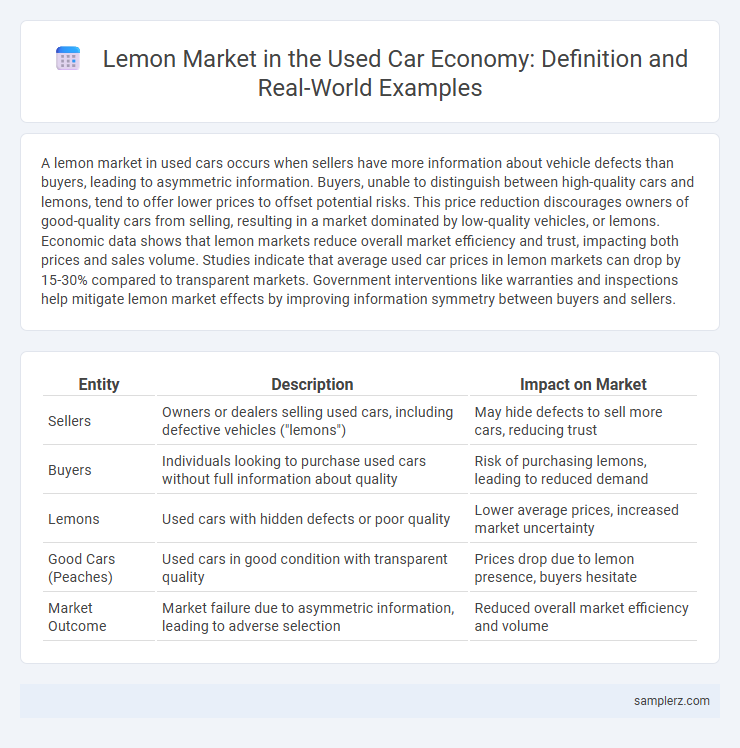A lemon market in used cars occurs when sellers have more information about vehicle defects than buyers, leading to asymmetric information. Buyers, unable to distinguish between high-quality cars and lemons, tend to offer lower prices to offset potential risks. This price reduction discourages owners of good-quality cars from selling, resulting in a market dominated by low-quality vehicles, or lemons. Economic data shows that lemon markets reduce overall market efficiency and trust, impacting both prices and sales volume. Studies indicate that average used car prices in lemon markets can drop by 15-30% compared to transparent markets. Government interventions like warranties and inspections help mitigate lemon market effects by improving information symmetry between buyers and sellers.
Table of Comparison
| Entity | Description | Impact on Market |
|---|---|---|
| Sellers | Owners or dealers selling used cars, including defective vehicles ("lemons") | May hide defects to sell more cars, reducing trust |
| Buyers | Individuals looking to purchase used cars without full information about quality | Risk of purchasing lemons, leading to reduced demand |
| Lemons | Used cars with hidden defects or poor quality | Lower average prices, increased market uncertainty |
| Good Cars (Peaches) | Used cars in good condition with transparent quality | Prices drop due to lemon presence, buyers hesitate |
| Market Outcome | Market failure due to asymmetric information, leading to adverse selection | Reduced overall market efficiency and volume |
Understanding the Lemon Market Phenomenon in Used Cars
Lemon markets in used cars arise due to asymmetric information, where sellers possess more knowledge about vehicle defects than buyers, leading to a decline in overall market quality. Buyers, anticipating the risk of defective cars or "lemons," are willing to pay only average prices, which drives owners of high-quality cars out of the market. This information imbalance causes market inefficiency, reducing trust and limiting the trade of reliable used vehicles.
Key Characteristics of Lemon Used Cars
Lemon used cars typically exhibit significant hidden defects that reduce their value and reliability, despite appearing superficially sound. These vehicles often have undisclosed mechanical issues or accident histories, leading to high repair costs and frequent breakdowns. Buyers face asymmetric information problems, as sellers possess more knowledge about the car's condition, resulting in adverse selection in the used car market.
Adverse Selection: How Information Asymmetry Affects Buyers
In the used car market, adverse selection occurs when sellers have more information about vehicle quality than buyers, leading to a higher proportion of low-quality "lemons" on the market. Buyers, unable to accurately assess car conditions, tend to offer lower prices, which discourages sellers of high-quality cars from participating. This information asymmetry results in market inefficiency, reducing overall trust and transaction volume.
Real-World Examples of Lemon Market Cases in Used Car Sales
The used car market frequently exhibits lemon market characteristics, where sellers have more information about vehicle quality than buyers, leading to adverse selection. For instance, studies reveal that approximately 20% of used cars sold in the U.S. are lemons, often resulting in a significant price discount reflecting potential defects and uncertainties. High-profile cases such as the 2015 Volkswagen emissions scandal exacerbated buyer distrust, further illustrating how asymmetrical information drives inefficiencies and price distortions in the used car market.
Seller Strategies in Lemon Markets: Concealing Defects
Sellers in lemon markets often conceal defects to maximize profits by hiding or downplaying vehicle problems, making it difficult for buyers to assess true quality. These strategies include masking mechanical issues, manipulating odometer readings, and providing incomplete maintenance records, which exploit information asymmetry between buyers and sellers. Such tactics exacerbate market inefficiencies and erode buyer trust, leading to adverse selection and a decline in overall market quality.
Buyer Reactions to Lemon Market Risks in Used Cars
Buyers facing lemon market risks in used cars often respond by demanding lower prices or opting for certified pre-owned vehicles to mitigate potential defects. Many rely on third-party inspections and vehicle history reports to reduce information asymmetry between sellers and buyers. This cautious behavior can lead to reduced market liquidity and increased transaction costs within the used car industry.
Market Outcomes: Quality Deterioration and Price Reduction
In the used car market, asymmetric information leads to lemon market conditions where sellers possess more knowledge about vehicle quality than buyers. This information gap causes quality deterioration, as only lower-quality cars--lemons--remain on the market due to adverse selection. Consequently, average market prices decline, reflecting buyers' risk aversion and decreased willingness to pay for uncertain vehicle quality.
Regulatory Responses: Lemon Laws and Their Effectiveness
Lemon laws provide legal protections for consumers who purchase defective used cars, requiring sellers to repair, replace, or refund faulty vehicles within a specified period. These regulations aim to reduce information asymmetry and restore consumer confidence in the used car market by holding sellers accountable. Studies indicate that stringent lemon laws correlate with higher used car prices and increased market transparency, improving overall market efficiency.
The Role of Certification and Warranties in Reducing Lemons
Certification programs and warranties play a critical role in reducing the prevalence of lemons in the used car market by enhancing buyer confidence and providing assurance of vehicle quality. Certified pre-owned (CPO) vehicles undergo rigorous inspections and meet manufacturer standards, significantly decreasing information asymmetry between sellers and buyers. Warranties offer protection against unexpected repairs, incentivizing sellers to maintain higher-quality vehicles and discouraging the sale of defective cars.
Lessons Learned: Economic Impacts of Lemon Markets on Used Car Industry
Lemon markets in the used car industry highlight the economic impact of information asymmetry, where sellers possess more knowledge about vehicle quality than buyers, leading to market inefficiencies. This imbalance causes adverse selection, driving higher-quality cars out of the market and reducing overall trust, thereby shrinking market size and lowering transaction volumes. Understanding these dynamics is crucial for designing policies that enhance transparency, protect consumers, and stabilize the used car market.

example of lemon market in used car Infographic
 samplerz.com
samplerz.com